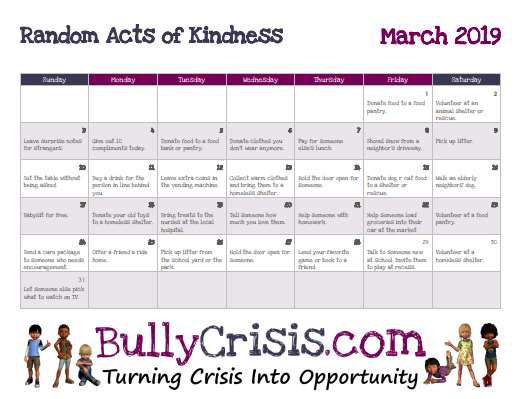Last month we celebrated National Random Acts of Kindness Day and hope everyone had an opportunity to throw kindness around like confetti!
At Bully Crisis, we believe that acts of kindness should be a part of everyone’s daily routine. Small acts of kindness don’t have to cost very much or take a whole lot of time. When someone gets involved in performing small random acts of kindness, not only does the recipient feel appreciated, the giver gets a boost of positive emotions too.
One of the most effective ways to combat bullying is to show kindness to others. Acts of kindness show the recipient respect and intentionality.
When a target of bullying performs intentional acts of kindness, it empowers them and gives them a sense of control over their situation. When a bully is the recipient of an act of kindness, they feel appreciated and valued. Kind children are statistically less likely to be involved in bullying behavior.
Kindness is psychologically the opposite if bullying. Science has proven that children feel a positive boost in emotions when they are helping others.
Endorphins are one of several chemicals in the brain that are attributed to a sense of happiness. Children receive a “helper’s high”, giving them a sense of pride, a feeling of self-worth and a sense of belonging. Dopamine is another brain chemical that impacts behavior, mood, cognition and sleep. Oxytocin is attributed to intimacy, trust, self-esteem, optimism and relationship bonding. Serotonin affects mood and helps people feel a sense of accomplishment. Acts of kindness increase the production of these chemicals in the brain.
Children learn by example, so remember, parents and educators…including acts of kindness in your daily routine not only has a positive effect on you, but on your children as well!
For more ideas, click the above link for our March Random Acts of Kindness calendar.
#randomactsofkindness #bullyfreebeginswithme




Recent Comments